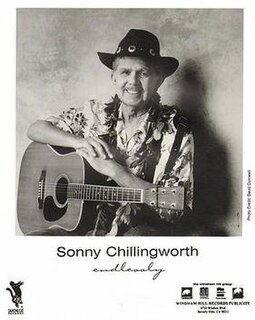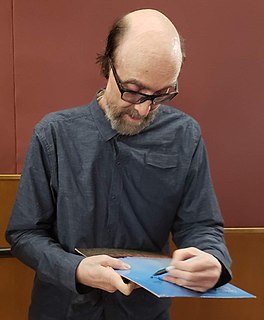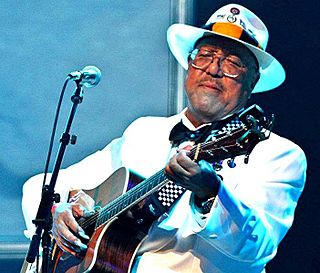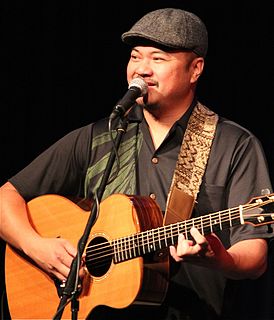The music of Hawaii includes an array of traditional and popular styles, ranging from native Hawaiian folk music to modern rock and hip hop. Styles like slack-key guitar are well known worldwide, while Hawaiian-tinged music is a frequent part of Hollywood soundtracks. Hawaii also made a contribution to country music with the introduction of the steel guitar. In addition, the music which began to be played by Puerto Ricans in Hawaii in the early 1900s is called cachi cachi music, on the islands of Hawaii.

Keola Beamer is a Hawaiian slack-key guitar player, best known as the composer of "Honolulu City Lights" and an innovative musician who fused Hawaiian roots and contemporary music. Keola Beamer descends from one of Hawaii's most respected musical families.

The lap steel guitar, also known as a Hawaiian guitar, is a type of steel guitar without pedals that is typically played with the instrument in a horizontal position across the performer's lap. Unlike the usual manner of playing a traditional acoustic guitar, in which the performer's fingertips press the strings against frets, the pitch of a steel guitar is changed by pressing a polished steel bar against plucked strings. Though the instrument does not have frets, it displays markers that resemble them. Lap steels may differ markedly from one another in external appearance, depending on whether they are acoustic or electric, but in either case, do not have pedals, distinguishing them from pedal steel guitar.

Edwin Bradfield Liloa Chillingworth, Jr., known as Sonny Chillingworth, was an American guitarist and singer. Widely influential in Hawaiian music, he played slack-key guitar and is widely regarded as one of the most influential slack-key guitarists in history.

Philip Kunia Pahinui was a slack-key guitarist and singer of Hawaiian music.

Slack-key guitar is a fingerstyle genre of guitar music that originated in Hawaii after Portuguese cowboys introduced Spanish guitars there in the late 19th century. The Hawaiians did not embrace the tuning of the traditional Spanish guitars they encountered. They re-tuned the guitars to sound a chord and developed their own style of playing, not using a flat pick, but plucking the strings. Most slack-key tunings can be achieved by starting with a guitar in standard tuning and detuning or "slacking" one or more of the strings until the six strings form a single chord, frequently G major.
The Grammy Award for Best Hawaiian Music Album was an honor presented to recording artists from 2005 to 2011 for quality Hawaiian music albums. The Grammy Awards, an annual ceremony that was established in 1958 and originally called the Gramophone Awards, are presented by the National Academy of Recording Arts and Sciences of the United States to "honor artistic achievement, technical proficiency, and overall excellence in the recording industry, without regard to album sales or chart position".

George Winston is an American pianist, guitarist, harmonicist, and record producer. He was born in Michigan and raised mainly in Montana, as well as Mississippi and Florida. He is best known for his solo piano recordings. Each of several of his albums from the early 1980s have sold millions of copies. He plays in three styles: the melodic approach he developed that he calls "rural folk piano"; stride piano, primarily inspired by Thomas "Fats" Waller and Teddy Wilson; and his primary interest, New Orleans R&B piano, influenced by James Booker, Professor Longhair, and Henry Butler.

Raymond Kaleoalohapoinaʻoleohelemanu Kāne, was one of Hawaii's acknowledged masters of the slack-key guitar. Born in Koloa, Kauaʻi, he grew up in Nanakuli on Oʻahu's Waiʻanae Coast where his stepfather worked as a fisherman.

Dennis David Kahekilimamaoikalanikeha Kamakahi was a Hawaiian slack key guitarist, recording artist, music composer, and Christian minister. He was a three-time Grammy Award winner, and in 2009 he was inducted into the Hawaiian Music Hall of Fame.
The Whiskeyhill Singers were an American folk revival group formed in early 1961 by Dave Guard after he left The Kingston Trio. Guard formed the Singers as an attempt to return to the Trio's earlier roots in folk music. The Singers lasted about six months before disbanding. During that short period the group released one album, Dave Guard & The Whiskeyhill Singers, and recorded a number of songs for the soundtrack of How the West Was Won, but only four of these were used in the movie.
The Brothers Cazimero was a Hawaiian musical duo made up of Robert Cazimero on bass and Roland Cazimero on twelve string guitar. Robert also played piano as a solo musician. The Cazimeros got their start during the Hawaiian Renaissance with ukulele and slack-key guitarist Peter Moon's band, The Sunday Manoa, on their first recording, Guava Jam. Since that time, The Brothers Cazimero have released at least 36 recordings and three DVDs. For three decades, the group performed at the annual Lei Day Concert. They made their Carnegie Hall debut in 1989.

Makana, born Matthew Swalinkavich, is a slack-key guitar player, singer, and composer.

Patrick Landeza is a contemporary Hawaiian slack key guitarist. He is notable as the first mainland-born Hawaiian to win a Nā Hōkū Hanohano music award. He was born in Berkeley, California on June 23, 1972.
The Nā Hōkū Hanohano Awards, occasionally called the Nā Hōkū Awards or Hoku Awards, are the premier music awards in Hawaii. They are considered to be Hawaii's equivalent of the Grammy Awards. "Nā Hōkū Hanohano" means "Stars of Distinction" in Hawaiian – "hōkū" means "star", "nā" makes it plural, and "hanohano" means "glorious, worthy of praises". The awards were founded in 1978 by radio personality Krash Kealoha of KCCN-AM, a radio station which focused on traditional Hawaiian music. He launched the first awards with the support of the owner of the radio station Sydney Grayson, and his fellow DJs Kimo Kaho‘āno and Jacqueline “Skylark” Rossetti.

Cyril Pahinui was a slack-key guitarist and singer of Hawaiian music.
Keala is a given name of Hawaiian origin. Notable people with the given name include:
Kuana Torres Kahele is a Hawaiian musician, vocalist, songwriter, record producer, dancer, and educator from Hilo, Hawaii. Known primarily for his original acoustic compositions, Kahele arranges traditional Hawaiian music as well, performing and recording with instruments such as ʻukulele, guitar, ipu, and bass. The majority of his lyrics are written and performed in the Hawaiian language. After learning Kane Hula and Haku Mele in his teens, in 1995 Kahele co-founded Nā Palapalai, a Hawaiian music group that has released a number of albums. Several have charted in the top five on the Billboard Top World Albums chart, and the group has won a large number of Nā Hōkū Hanohano Awards, including Group of the Year.
Alan Akaka is a Hawaiian steel guitarist and educator. The son of former congressman and senator Daniel Akaka, he has taught at several schools and is in charge of the Hawaiian music school Ke Kula Mele. In 2014 he successfully led a petition to prevent the ukulele from being named the official state musical instrument, arguing that the steel guitar was more reflective of Hawaiian tradition.
Sudden Rush is a nā mele paleoleo group from Hilo, Hawaii, comprising Shane Veincent, Caleb Richards, Don Keʻala Kawaʻauhau Jr. and Rob Onekea. They have been called the most well-known and successful of the Hawaiian hip hop groups and were the first to blend American hip hop with Hawaiian language and musical style to produce nā mele paleoleo. Formed in 1993, they released three studio albums in the next ten years, followed by the belated Overthrow EP in 2018. Their music is explicitly political and supportive of the Hawaiian sovereignty movement.









